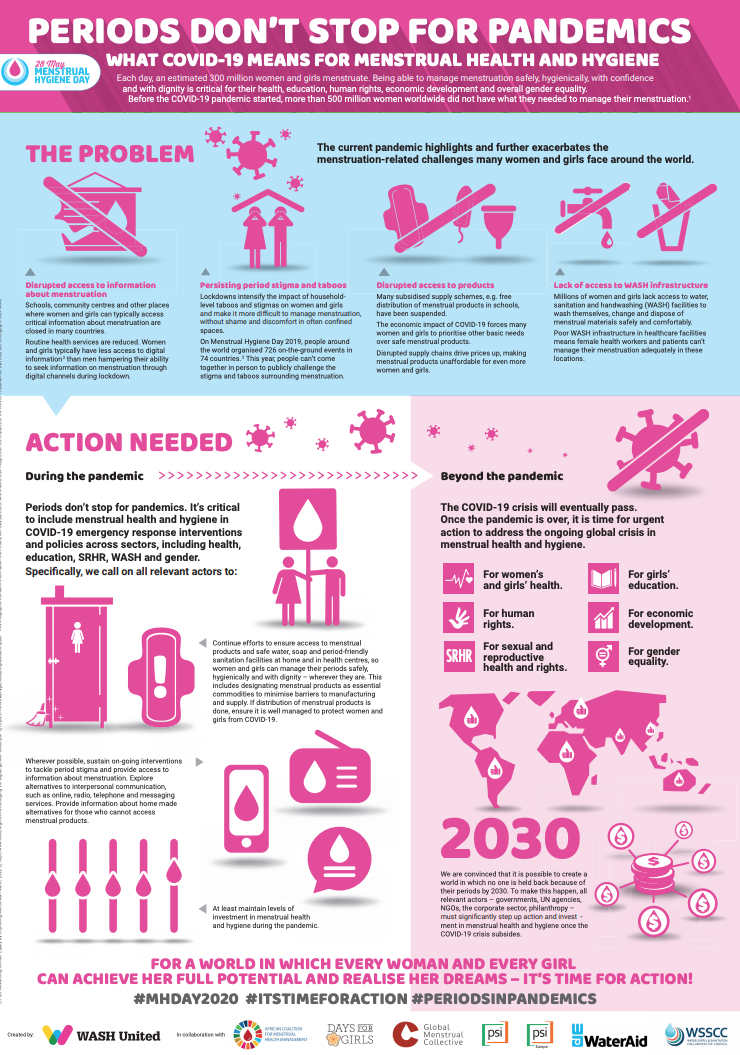Almost 1.8 billion girls, women, transgender men and non-binary persons of reproductive age have their periods. Yet, most communities in low and middle-income countries face different challenges in accessing menstrual health information and materials.
This was the reality for millions in pre-COVID-19 times, however, the current pandemic has exacerbated the existing vulnerabilities in many ways:
- Periods don’t pause for pandemics, yet access to menstrual hygiene products, such as sanitary pads, tampons can be disrupted. This may be due to increased prices, panic buying, lockdowns creating an out-of-stock situation for local vendors.
- Lack of access to water, sanitation and hygiene (WASH) services, due to prevalent gaps in safely managed service provision, non-payments or increased costs of services. For menstruators who are tested COVID positive or self-quarantining may lack access to piped water supply, or handwashing facilities or soaps/sanitizers.
- Lack of critical information on reproductive health or combating taboos and stigma: The conventional approaches such as congregating community members during information and empowerment sessions are limited due to an unequivocal appeal to stay at home as well as practice social distancing. Even though online interactions and platforms have increased internet access and affordability remains the biggest challenge for the rural population.
- Conflicting priorities during pandemics in poorest households, wherein food or other essential items will be given preference over replenishing monthly menstrual hygiene materials.
In Kenya, I interviewed Daniel Sironka, a public health officer and menstrual health management (MHM) champion working in Narok County. Sironka talks to morans and elders in pastoralist communities on the need to normalize menstrual conversations, “only a handful of households are connected to electrical power in most of the hard-to-reach areas, compounded with pastoralist cultural practices premised on patriarchy, the design and delivery of menstrual health information call for innovation if no one is to be left behind in such areas.” He continues, “despite the situation, we have a duty and responsibility to ensure the elimination of inequalities and strengthening WASH systems to better deliver menstrual services and products to the marginalized.”
Currently, most parts of the country especially central, northern and western Kenya are experiencing floods as a result of March-May long rains. These floods have led to communities being displaced and settling in makeshift camps without adequate clean water, sanitation and hygiene facilities. “Regularly washing hands with soap and running water as well as maintaining social distance is the least of worries for communities living in such situations. There are no latrines further exposing communities to water-borne diseases including cholera,” says Nobert Musundi, the County Public Health Officer (CPHO), Trans Nzoia County. “I am a trained MHM champion and together with other well-wishers, mostly faith-based organizations (FBOs) we’ve been distributing sanitary pads to women and girls in the camps.” Coupled with other socioeconomic vulnerabilities stemming from COVID-19, the needs of menstruators have evolved to be as dynamic and complex as the settings they live in. Musundi is, therefore, doubtful whether partners, stakeholders and communities alike are adequately prepared to live up to the unique demands of this year’s Menstrual Hygiene Day. “It’s time for action to deliver on the promise of good menstrual health and hygiene for all menstruators caught between a disaster and pandemic because periods do not stop for pandemics”
At East and Central Africa Menstrual Health Consortium, a youth-led alliance with a membership base in more than eight countries, we are advocating for the rights to dignified periods during pandemics and beyond. We believe continued engagement of civil society organizations and other implementing partners within the WASH sector will help with the generation of data for advocacy and evidence-based interventions through vulnerability profiling on primary likelihood to exposure based on elements such as women-headed households, persons with disabilities, women and girls living in extreme poverty etc. During these unprecedented times of the pandemic, and given the various forms of vulnerabilities faced by different communities, let us make it intentional to review our national WASH policy development processes and operationalization frameworks where partners and stakeholders commit and invest in MHM, thereby guaranteeing enabling environments that are exclusively dedicated to improving menstrual experiences of women and girls. Additionally, through World Leaders’ Call to Global Action on COVID-19, we urge Sanitation and Water For All to keep up and build the momentum on making WASH a political and financial priority both during the pandemic and beyond.
